Recommendation Letter From Professor
[Your Name]
[Your Address]
[City, State, ZIP Code]
[Your Email Address]
[Your Phone Number]
[Today's Date]
[Professor's Name]
[Professor's Title]
[Department Name]
[University Name]
[University Address]
[City, State, ZIP Code]
Dear Professor [Professor's Last Name],
I hope this letter finds you in good health and high spirits. I am writing to request a recommendation letter from you as I embark on the next phase of my academic journey and professional pursuits.
I have had the privilege of being your student during [mention the period or specific course] at [University Name], and I must express my utmost gratitude for the invaluable knowledge and guidance you have provided me throughout my time under your tutelage. Your passion for the subject matter and dedication to fostering a stimulating learning environment have left a lasting impression on me.
I am applying to [mention the purpose of the application, e.g., graduate school, internship, job position], and I believe that your commendation of my academic abilities, work ethic, and character would greatly enhance my application. Your firsthand experience with my academic performance and your insights into my potential for growth would undoubtedly add weight to my application.
If you would be kind enough to write this recommendation letter on my behalf, I would be thrilled to provide you with any additional information or materials that might aid in composing the letter. These could include my resume, transcripts, specific achievements, or any notable projects I have undertaken.
The deadline for submission of the recommendation letter is [mention the deadline date], and if possible, I would be grateful to receive the letter a few days prior to that date to ensure timely submission of my application.
Thank you for considering my request. I understand that your time is valuable, and I sincerely appreciate your willingness to support me in this endeavor. Please feel free to contact me at [Your Phone Number] or [Your Email Address] should you require any further information or have any questions.
Once again, thank you for your unwavering commitment to your students and for being a source of inspiration to me. I look forward to hearing from you and hope to continue making you proud in my future academic and professional pursuits.
Sincerely,
[Your Full Name]
Formal Recommendation Letter For Graduate Studies
Subject: Recommendation for Graduate Program Admission
Dear Admissions Committee,
It is with great enthusiasm that I recommend [Student's Full Name] for admission into your esteemed graduate program. I have had the pleasure of teaching [Student] in multiple courses during their undergraduate studies, and I can confidently attest to their dedication, intellectual curiosity, and academic excellence.
[Student] consistently demonstrated strong analytical skills, clear communication abilities, and an eagerness to engage in critical discussions. Their final research project on [topic] was among the finest I have reviewed, reflecting both depth of knowledge and originality of thought.
Beyond academics, [Student] has actively contributed to the university community through [extracurricular activities, leadership roles]. Their sense of responsibility and collaborative spirit set them apart as a well-rounded individual.
I have no doubt that [Student] will excel in your program and make meaningful contributions. Please feel free to reach out to me if you require further information.
Sincerely,
[Professor's Name]
Recommendation Email For Internship Application
Subject: Internship Recommendation for [Student's Name]
Dear [Internship Coordinator/Employer],
I am writing to recommend [Student's Name] for the internship opportunity at your organization. As [Student]'s professor for [course/subject], I have observed their remarkable ability to apply theoretical knowledge to practical situations.
[Student] has shown excellent problem-solving skills and adaptability in class projects. Their collaborative nature and willingness to learn make them a strong fit for a professional environment.
I believe [Student] would be an asset to your team and would gain invaluable experience under your guidance. I highly recommend considering them for the position.
Best regards,
[Professor's Name]
Recommendation Letter For Scholarship Application
Subject: Recommendation for [Student's Name] – Scholarship Application
Dear Scholarship Committee,
I am honored to recommend [Student's Name] for your prestigious scholarship. As their professor, I have witnessed their consistent academic excellence, strong leadership, and deep commitment to community service.
[Student] maintains an outstanding academic record while balancing extracurricular commitments, including [clubs, volunteering]. Their ability to excel academically while giving back to the community is truly commendable.
I am confident that [Student] embodies the qualities your scholarship seeks to promote and will continue to inspire others through their dedication and vision.
Thank you for considering my recommendation.
Sincerely,
[Professor's Name]
Quick Recommendation Email For Job Application
Subject: Recommendation for [Student's Name]
Dear [Hiring Manager],
I am pleased to recommend [Student's Name] for the role at your organization. I had the opportunity to teach [Student] in [course], where they demonstrated excellent communication skills, professionalism, and technical competence.
They would bring enthusiasm, dedication, and fresh perspectives to your team. Please consider this a strong endorsement.
Best regards,
[Professor's Name]
Heartfelt Recommendation Letter For Study Abroad
Subject: Recommendation for Study Abroad Program
Dear Program Director,
It gives me great pleasure to recommend [Student's Name] for your study abroad program. In my years of teaching, I rarely encounter a student as eager to embrace cultural exchange and academic growth as [Student].
[Student] approaches learning with curiosity, respect, and adaptability. Their ability to engage with diverse perspectives and environments makes them an ideal candidate for international study.
I wholeheartedly support their application and believe that this opportunity will enrich their academic journey while allowing them to contribute positively to your program.
Warm regards,
[Professor's Name]
Provisional Recommendation Letter Pending Results
Subject: Provisional Recommendation for [Student's Name]
Dear [Admissions Committee/Employer],
I am recommending [Student's Name] for your program with the understanding that their final results are pending. Based on their performance in my class and ongoing research work, I am confident they will achieve strong outcomes.
[Student] has shown consistent growth, a solid work ethic, and a genuine interest in the field. While their final grades are yet to be published, I believe their academic trajectory demonstrates promise and capability.
I encourage you to give their application due consideration, as I am confident they will meet or exceed expectations.
Sincerely,
[Professor's Name]
Official Recommendation Letter For PhD Program
Subject: Strong Recommendation for [Student's Name] – PhD Application
Dear Doctoral Admissions Committee,
I am writing to provide my strongest recommendation for [Student's Name] as they apply for admission to your PhD program in [field]. I have supervised [Student] closely during their undergraduate and postgraduate research work and can attest to their exceptional academic abilities and research potential.
[Student] possesses advanced analytical skills, intellectual independence, and a strong sense of curiosity. Their research on [topic] demonstrated originality and depth, setting them apart from their peers. They are adept at synthesizing complex information and producing well-structured academic arguments.
In addition to research, [Student] is a dedicated mentor to junior students and an active contributor to our academic community. I am confident that they will excel in your PhD program and contribute significantly to both research and teaching.
Please consider this letter as an official and wholehearted endorsement of their candidacy.
Yours sincerely,
[Professor's Name]
Friendly Recommendation Message For Club Membership
Subject: Recommendation for [Student's Name] – Club Membership
Hello [Club Coordinator],
I am delighted to recommend [Student's Name] for membership in your club. As their professor, I have seen their enthusiasm for [related subject/activity] and believe they would be a great addition to your community.
[Student] is friendly, responsible, and genuinely passionate. I think they will thrive in your club and contribute positively to group activities.
Thanks for considering this recommendation!
Best,
[Professor's Name]
What is a recommendation letter from a professor and why do you need it
A recommendation letter from a professor is a formal document in which a faculty member endorses a student’s skills, character, and suitability for a particular opportunity. It is often required for:
- Graduate or doctoral program applications
- Scholarships or fellowships
- Internship or job applications
- Study abroad or exchange programs
- Membership in academic or professional organizations
The purpose is to provide credibility, context, and a professional endorsement that strengthens the student’s application.
Who should write the recommendation letter
The letter should be written by:
- Professors who have taught the student in relevant subjects
- Academic advisors or supervisors who oversaw research projects
- Department heads or senior faculty members with authority
- Mentors who can evaluate both academic and personal qualities
The credibility of the recommender is essential, so the professor must have direct academic or professional experience with the student.
To whom should the recommendation letter be addressed
The recipient of a professor’s recommendation letter may vary depending on context:
- Admissions committees of universities or colleges
- Scholarship boards or funding organizations
- Employers offering internships or entry-level positions
- Program coordinators for study abroad or fellowships
- Club or association membership panels
When the exact name of the recipient is unknown, a safe approach is to use “Dear Admissions Committee” or “To Whom It May Concern.”
When do you need a recommendation letter from a professor
Common scenarios include:
- Applying for postgraduate or doctoral studies
- Competing for scholarships or academic funding
- Seeking internships or first jobs requiring academic validation
- Applying for study abroad, exchange, or training programs
- Joining honor societies, clubs, or special academic projects
Timing matters — students should request the letter well in advance of application deadlines.
How to write and send a professor’s recommendation letter
Steps to follow:
- Begin with a clear subject and greeting.
- Introduce the student and state the context of your relationship.
- Highlight academic strengths, skills, and achievements.
- Mention personal qualities like leadership, teamwork, and integrity.
- Provide specific examples or anecdotes to add credibility.
- Conclude with a strong endorsement and an offer for follow-up.
- Send via email if requested digitally or print on official letterhead if required physically.
Requirements and prerequisites before writing the letter
Checklist for preparation:
- Confirm the deadline and requirements of the receiving institution.
- Ask the student for a résumé, transcript, or personal statement.
- Clarify the specific purpose of the letter (job, study, scholarship).
- Ensure the professor has sufficient knowledge of the student’s work.
- Use official letterhead if required.
Formatting guidelines for a professor’s recommendation letter
- Length: Typically one page, two at most.
- Tone: Formal, respectful, and supportive.
- Structure: Introduction, body (achievements and qualities), conclusion.
- Wording: Clear, concise, and professional; avoid vague praise.
- Mode of sending: Email, online portal, or printed on letterhead.
- Etiquette: Avoid exaggeration, stick to verifiable qualities, and always proofread.
Common mistakes to avoid when writing a recommendation letter
- Being too generic and lacking specific examples
- Overly short or rushed letters
- Repetition of the student’s résumé instead of adding insight
- Negative or lukewarm tone
- Misspelling the student’s or institution’s name
- Missing the submission deadline
Elements and structure of an effective recommendation letter
Key elements to include:
- Subject line (for emails)
- Proper greeting
- Context of professor-student relationship
- Student’s academic strengths and achievements
- Relevant personal qualities
- Specific examples or stories
- Strong endorsement statement
- Closing with contact information
After sending the letter: follow-up and next steps
- Confirm with the student that the letter was sent successfully.
- Keep a copy for personal records.
- Be prepared to answer follow-up questions from the institution.
- If requested, provide additional details or references.
- Inform the student if confirmation of receipt was received.
Tricks and tips for writing a strong recommendation letter
- Use concrete examples to make the student stand out.
- Highlight unique qualities that differentiate them from peers.
- Tailor the letter to the specific program or job.
- Be honest and realistic; avoid empty superlatives.
- Write early and avoid last-minute submissions.
- Maintain a professional but supportive tone.
Compare and contrast recommendation letters from professors and employers
- Professor’s Letter: Focuses on academic performance, research, and intellectual potential.
- Employer’s Letter: Emphasizes work ethic, practical skills, and professional experience.
- Similarities: Both highlight character, responsibility, and suitability for opportunities.
- Differences: Academic vs. workplace focus; formal vs. applied achievements.
- Alternatives: Personal references or peer recommendations when professors/employers are unavailable.

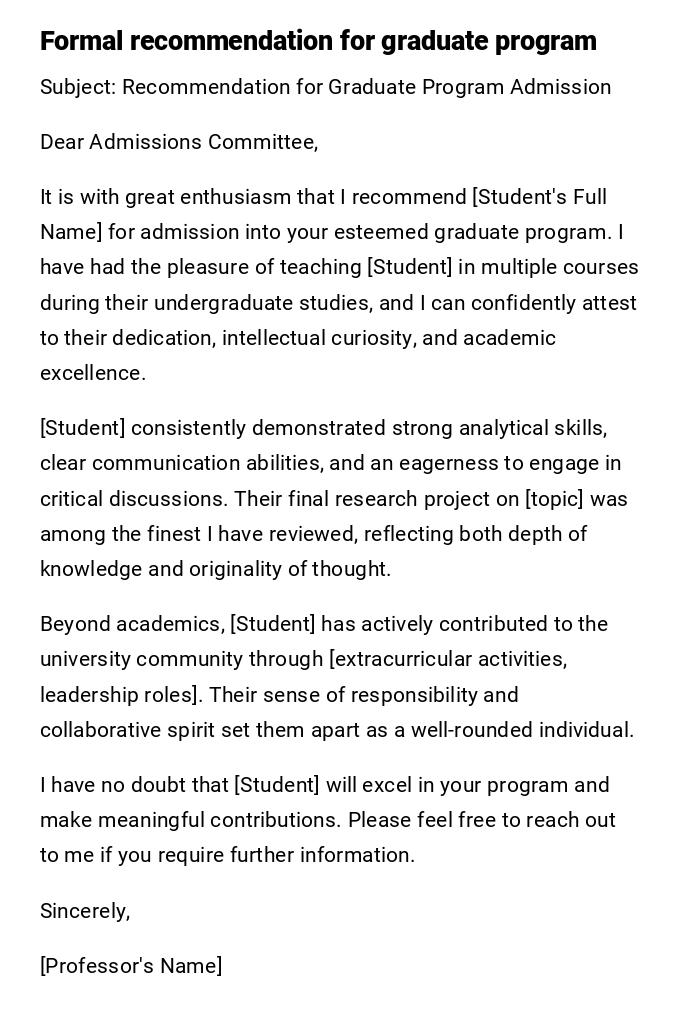
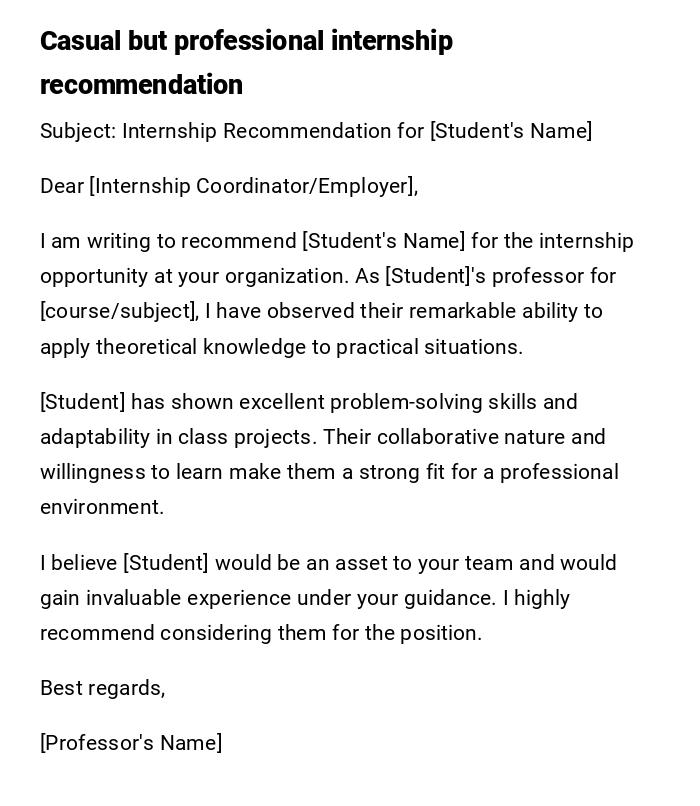
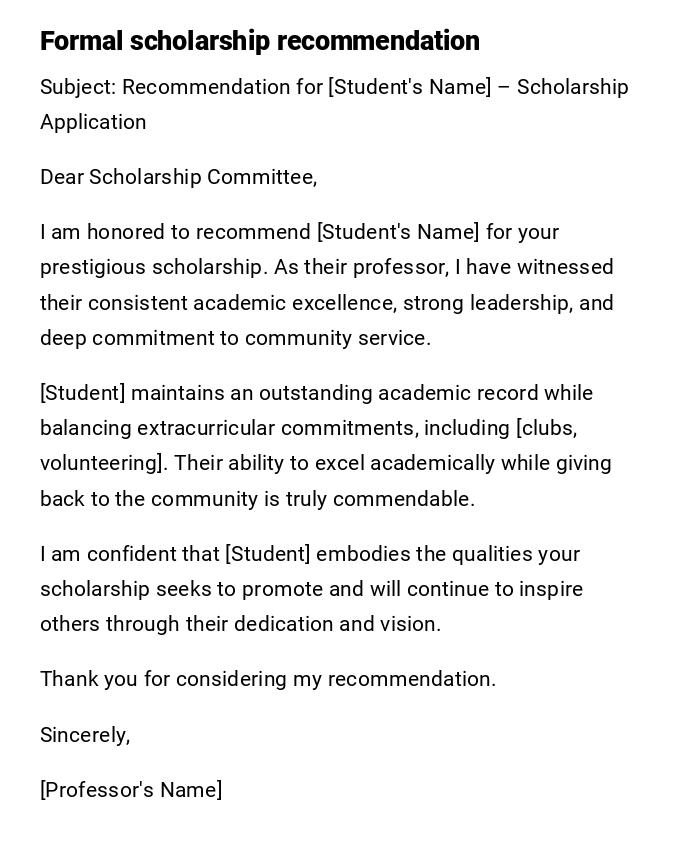
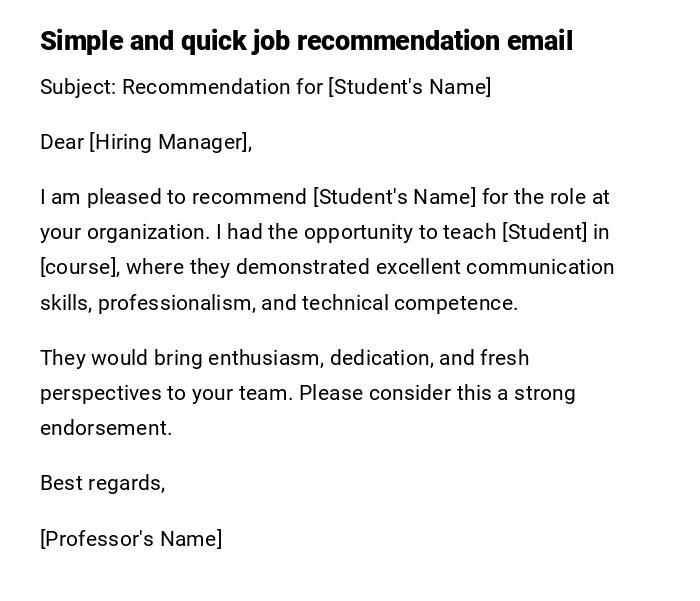
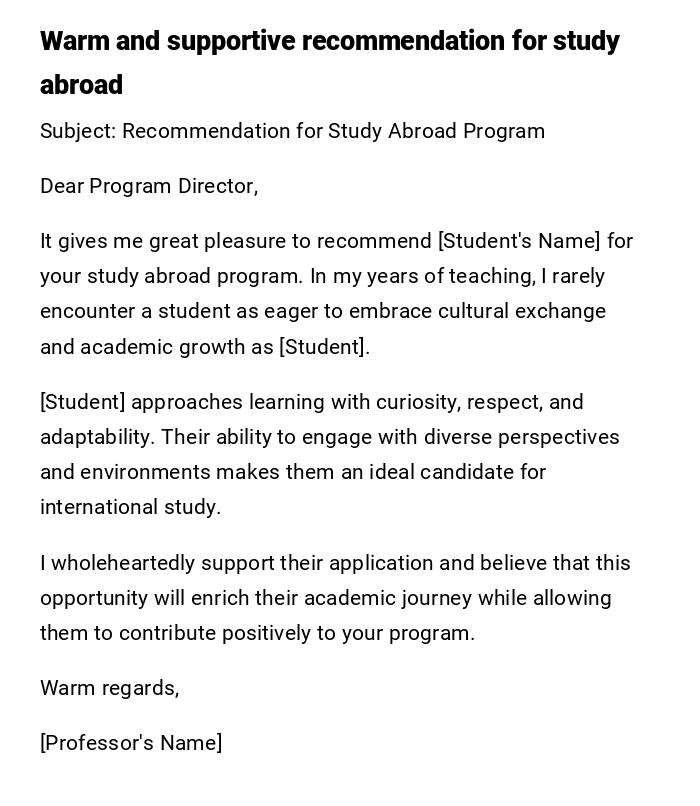
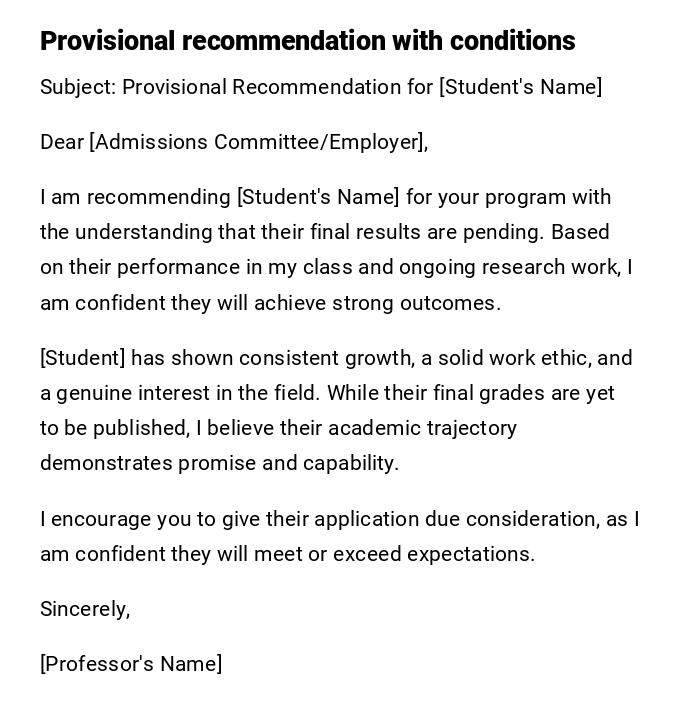
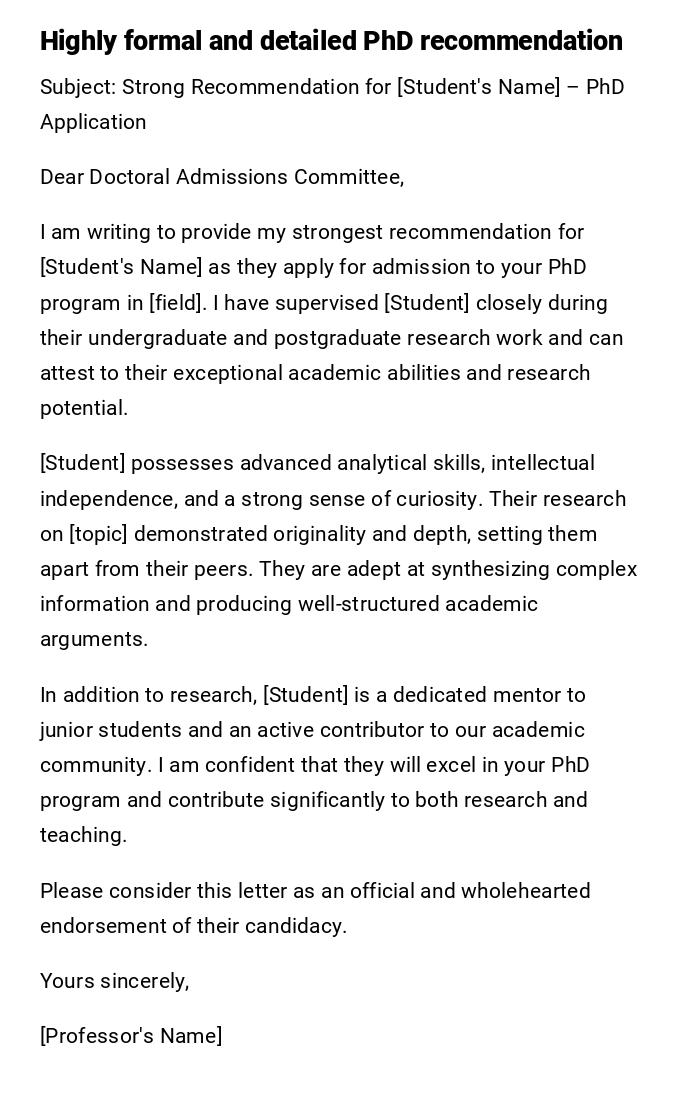
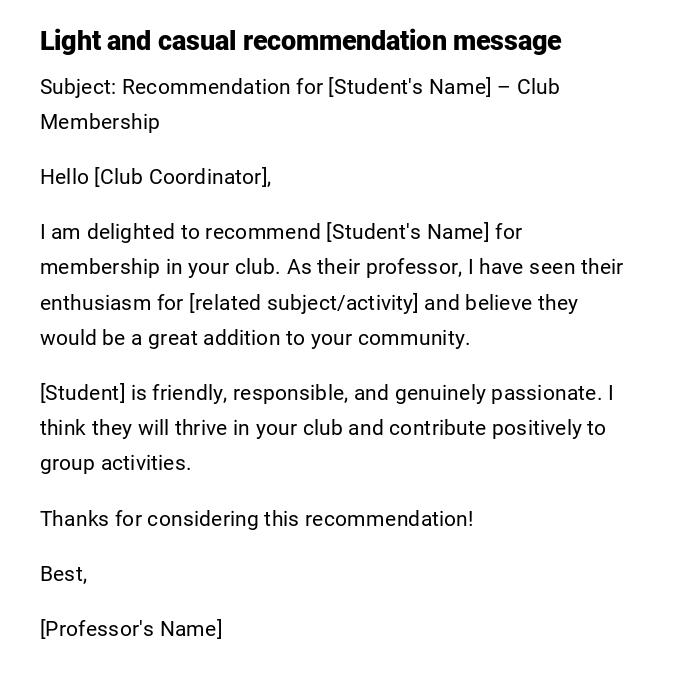

 Download Word Doc
Download Word Doc
 Download PDF
Download PDF